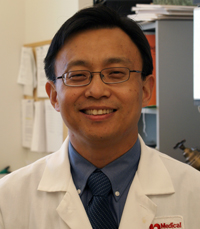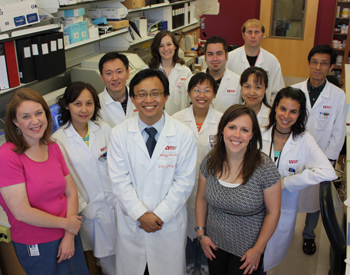 |
Jialin Zheng, M.D. |
Dr. Zheng’s laboratory examines the potential mechanisms through which inflammation affects brain-injury repair in patients with neurological complications such as HIV-1 associated dementia.
Globally, about 40 million people are infected with HIV. About 10 percent to 20 percent of these people will develop HIV-1 associated dementia.
“We want to see how neuron repair is affected so we can see new ways in which to treat such conditions,” said Dr. Zheng, a professor in the department of pharmacology and neuroscience.
For this grant, Dr. Zheng’s team will examine the mechanisms that determine how a small protein called “stromal cell-derived factor-1” or “SDF-1” is affected by brain inflammation associated with HIV-1 associated dementia.
Normally, SDF-1 helps recruit neural stem cells that repair injuries to the brain. But during inflammation from HIV-1 associated dementia, an enzyme is released that damages SDF-1 and impairs its ability to recruit the stem cells needed to repair the injury. This exacerbates the HIV-1 associated dementia.
Using state of the art technologies such as gene array, proteomics, stem cell biology and animal models, Dr. Zheng’s team will try to determine why this happens and possibly how the process can be reversed.
Not only can these studies help answer questions raised by HIV-1 associated dementia but they can also answer questions raised by other studies in neurological diseases such as Alzheimer’s disease that are associated with brain inflammation.
“We want to see if we can protect this protein and also if there is a way to properly stimulate the stem cells to heal the injured neurons,” Dr. Zheng said.
Dr. Zheng credits his 11 person team and three co-investigators — Michael Boska, Ph.D., professor of radiology; Pawel Ciborowski, Ph.D., assistant professor of pharmacology and experimental neuroscience; and Tsuneya Ikezu, M.D., associate professor of pharmacology and experimental neuroscience — with doing exemplary work to secure the grant.
This is the second award Dr. Zheng’s team has received this year. This spring, they secured an NIH grant worth more than $416,000 to study other aspects of HIV-1 associated dementia.
Also, Nick Whitey, a Ph.D. graduate student on Dr. Zheng’s research team, was also awarded a NIH F31 fellowship. The award gives Whitey more than $82,000 for 2 ½ years to study neural stem cell differentiation during brain inflammation.
“It’s a true credit to our team members, who are always working diligently toward answering important and crucial questions,” Dr. Zheng said of the recent funding success.
 |
Dr. Zheng says his team is largerly responsible for his lab’s recent funding success. “Our team members … are always working diligently toward answering important and crucial questions,” he said. |
UNMC research support staff also have played a key role in creating this environment, he said.
“Many of people deserve credit for making UNMC so hospitable to research,” Dr. Zheng said. “UNMC is very dedicated to creating a wonderful research environment and this is apparent at every level of campus leadership.”
Dr. Zheng is an asset for UNMC who brings a special blend of energy, creativity and work ethic to the table, Dr. Rosenquist said.
“His having merited the support of NIH for several different projects speaks volumes about the high levels of enthusiasm and confidence that his peers hold for his work,” Dr. Rosenquist said. “At the same time that he shows great confidence in his scientific ability, he also is modest and self-effacing in his interaction with others, which — all-in-all — is a great and admirable combination.”